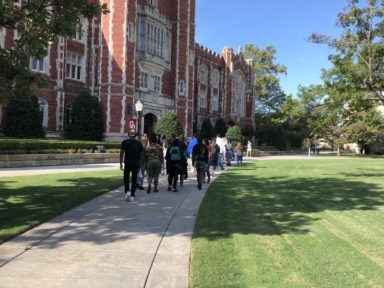A postsecondary education is important, especially in this ever-changing workplace where automation and technology are playing a larger role in most all professions. Learn more about scholarship opportunities available in Oklahoma and how to increase your changes of earning free tuition.
How Tulsa Area High School Students Can Get a College Degree or a Postsecondary Technical Education with Little or No Student Debt

Why a Postsecondary Education is Going to be Much More Important in the Future Currently about half of the jobs in Oklahoma only require a high school education. That is projected to drop to 25% in ten years. The reason is the next phase of automation using artificial intelligence and robotics that will rapidly change the economy of Oklahoma and particularly affect Tulsa. Tulsa is one of the most vulnerable cities in the US to employment changes from automation because 47% of the workforce is employed in repetitive task and low cognitive skill jobs according to a recent research report by the Brookings Institute. The includes jobs like chefs in restaurants, warehouse fulfillment workers, pharmacy assistants and construction. This technology is expected to be rapidly adopted and is projected to cut in half the opportunities for people with just a high school degree. Go to the YPNG.co home...
Eight Life Lessons I Learned Building My Career
Eight Life Lessons I Learned Building My Career (This is part of a YPNG Mentor Interview by Suzanne Dodson) LIFE LESSON #1 – Identify which of your “passions” are well suited for a hobby, and which are well suited for a career. Don’t choose a major just based on your salary… but weigh your future financial stability and job security alongside your passion for a chosen career path. I worked hard in high school and did better than average, but I was not at the very top of my class – I got more A’s than B’s, but not by much. I took several AP classes, but didn’t feel like I could take every AP class offered at my school and still maintain a decent GPA. Based on scholarship & financial aid offers from the schools I applied to, my college choice came down to University...
Scholarships, Financial Aid and Ways to Reduce College Costs
Scholarships, Financial Aid and Ways to Reduce College Costs Index (Click on Blue to Navigate) I. Waivers for College Applications and Testing Fees II. Application for Federal Student Aid ( FAFSA ) III. Types of Financial Aid IV. Financial Aid Programs Specifically for Oklahoma Students V. Improve Your Scholarship Hunt With Alternative Search Engines VI. Community Foundation Scholarships VII. How Scholarships are Paid VIII. Other Ways to Help Pay for College or Reduce Costs IX. Childcare in College X. Preparing a College Budget I. Fee Waivers for College Applications and Testing Colleges charge a fee to submit an admissions application and there are fees associated with taking the ACT and SAT academic tests that most colleges require. But these fees can be waived based on your family’s income. As a rule of thumb, if you qualify for free or reduced lunches, you will qualify for these fee waivers. You can apply...
Preparations for College Beginning the Freshman Year of HS
YPNG College Admissions Preparation Program Preparation + Intelligent Effort + Persistance = Success Index (Click on Blue or Scroll to Navigate) I. Deciding on a Career that is Right for You II. Your College Application 1. Essay 2. High School Resume and College Interviews 3. Letters of Recommendation III. ACT and SAT Test Scores 1. ACT/SAT prep resources that are completely “free”. IV. Other Things to Know 1. Student Services 2. Map Out Your Classes for Each Year V. Know the Requirements for an Entry Level Job 1. Develop Leadership Skill in High School 2. Strong Communication Skills 3. Demonstrate Teamwork I. Deciding on a Career that is Right for You Before you take any general career tests, do a thorough self- evaluation of your personal strengths and weaknesses. You intuitively know the subjects in school that you like and where you excel. But also look at your other abilities. For example, the YPNG Blog page...
Paid Internships and Information
Internships Paid internships offer you the opportunity to earn while you learn much like an apprenticeship. The main difference is that most apprenticeships involve the construction trades and can take up to five years to complete while a paid internship usually involves either a technical or white-collar job and can be completed in a shorter period of time and can last as little as a few months or one or two years. For example, one of the longest internships YPNG has listed is to train to become an auto technician. This involves six months working with techs at the dealership and then up to two years supplementing you r training at a technical school where you learn more about how to maintain th e types of vehicles sold at the dealership sponsoring your internship. There are also internships for both college and high school students that last for only...
Securing Oklahoma’s Economic Future
Securing Oklahoma’s Economic Future By Bill Langdon The declining level of investment in our kid’s education and healthcare is having economic consequences for Oklahoma and threatening the economic future of our state. We no longer have a competitive, well trained and healthy workforce and are not attracting enough well paying jobs that can reverse the declining standard of living faced by the families in our state. Here are the statistics employers see when they consider locating in Oklahoma. We rank 32nd in the percentage of people in our state over 25 that have a high school education but only 42nd in terms of those who have a college degree or 30.8% compared with 34% for the nation as a whole. In addition, Oklahoma now ranks 47th in terms of the educational quality of its public schools as of 2017 and 46th in terms of overall medical health. These are...
College Test Prep — SAT and ACT

College entrance exams don’t have to be a nightmare. Our SAT and ACT test prep tools, tips, and news can help you get ahead of the curve. Read More:
STEM Grads Projected to Earn Highest Average Starting Salaries

Among bachelor’s degree graduates from the Class of 2016, those from the STEM disciplines are expected to receive the highest starting salaries, according results of NACE’s Winter 2016 Salary Survey. The top three projected salaries are for engineering, computer sciences, and math and sciences graduates. Continue Reading
Make High School Count
No matter what you dream of doing with your life, preparing yourself for more education beyond high school is your wisest plan right now. Post-high school education can provide valuable experiences that contribute to a better quality of life for you. Here is a series of videos that will show you how to make the most of you time in high school: https://www.khanacademy.org/college-careers-more/college-admissions/making-high-school-count
Take These Steps to Find and Secure Scholarships
With tuition, room and board at four-year public colleges and universities averaging nearly $20,000 even for in-state applicants, and private schools charging an average of nearly $44,000, landing scholarships is crucial for many students. And it can be some of the most lucrative things a student can do, said Mark Kantrowitz, publisher and vice president of strategy for cappex.com, a college search website. Read More:
Why Starting at a Community College can be a Smart Option
Here is a link to an article about the advantages for someone interested in getting a four year degree or starting their college career at a community college for two years and then transferring. Read More
How To Attend College Without Student Loans
Here is a US News and World Report article on six ideas on ways to attend college without using student loans. Some new ideas that are worth a read and could help reduce if not eliminate your student deb. Learn More
How to Save Money on Textbooks
Students like are saving money through online marketplaces for used, new, rental or electronic textbooks. You can even rent textbooks rather than buy them. For example, Some McGraw Hill textbooks are 50% less as an electronic book. This article points out a number of online marketplaces and other strategies to reduce the cost of your textbooks. It was written by Danielle Douglas-Gabriel, a writer for the Washington Post, and has links to a number of resources. Read More
United States Military Entrance Processing
USMEPCOM is the first joint military and civilian organization providing a gateway through which applicants enter the armed service. the site covers everything you need to know about the enlistment process as well as links to all branches of the armed services including:
- Military enlistment process
- Your local MEPS
- Your MEPS personnel directory
- Processing forms
- Related publications
- Testing schedules*
- Entrance processing regulations
- MEPCOM Headquarters and resources
*Each applicant for military service is required to take the CAT-ASVAB, which measures aptitude in a broad range of career fields. A product of more than 50 years of research, the ASVAB is now available in both computerized (CAT-ASVAB) and traditional “paper and pencil” versions. Each service combines the test section results to produce its own unique scores for various career fields.
Free MAPP career test
Most career tests simply give you insights into your personality. The MAPP test also offers people new insights into what they’re naturally drawn toward and how they can develop this into a satisfying career. The test also gives young people a vision for what their future career could be. There are 900 jobs that are sorted in order of the student’s unique test results after they take the online career test. Take the MAPP Career and Personality Test for FREE The MAPP assessment has undergone extensive validity and reliability testing by a number of psychologists, including correlating the results to the Strong Interest Inventory®. Validity and reliability studies also indicate that the MAPP test is consistent over time. Take the MAPP Test for FREE
The 20 Fastest-Growing Jobs This Decade
This article discusses what US News and World Report feels are the 20 fastest growing jobs, by industry, in which employment should grow by 30 percent or more. Read More
Economists Say Millennials Should Consider Careers In Trades
With so many boomers retiring from the trades, the U.S. is going to need a lot more pipe-fitters, nuclear power plant operators, carpenters, welders, utility workers — the list is long. But the problem is not enough young people are getting that kind of training. Read more
International Scholarships

There are many opportunities for scholarships. Especially attractive are scholarships from the IT sector, which is one of the sectors that grew the fastest din recent years. It would be a benefit for you if you have some previous experience in developing Web and Andorid application, it can help you as a reference when applying for a scholarship. I want to suggest you that look for additional answers at www.heysuccess.com where you can explore the many opportunities for scholarships from around the world. You also have the option to set search parameters: location where you want to study, which sector, language, partially or fully paid etc. As proof you can look at a number of success stories of students who utilize this at https://www.heysuccess.com/heysuccess/testimonials. All I’m saying is from personal experience. In this way I started an international internship program.
High Paying Sales Jobs
This is and article from the Wall Street Journal that talks about the difficulty businesses are having recruiting young people to enter high tech sales jobs. The author points out that many people feel these kinds of jobs are risky and that sales careers have a stigma. But the sales positions described in this article pay about twice what you can earn at an average administrative job. For those of you who are outgoing and have an interest in sales and marketing, these kinds of high sales positions are something you should investigate. Read More
Has The Student Loan Crisis Been Solved?
This is a recent article in the New York times that points out changes that have been made to the Student Loan program. Specifically it describes the way the program has shifted to an income based repayment program with provisions for debt forgiveness under certain circumstances. There are also accelerated forgiveness programs for people who choose careers in fields like education and non profits. Make sure you understand how this loan program has evolved. Read More
The $140,000-a-year welding job Two-year degree and special skills
This is an article that points out some areas where technical training can provide young people with careers that pay as well those requiring college. Many welling programs can be taken in low cost or free community colleges with work/study or apprenticeships where you earn while you learn. Read more.
The Book of Majors 2016 by The College Board
For anyone doing research on a particular college major and colleges that offer a strong program in that major, this books is invaluable. The 2015 edition covers every college major identified by the U.S. Department of Education—over 1,200 majors are listed in all. This is also the only guide that shows what degree levels each college offers in a major, whether a certificate, associate, bachelor’s, master’s or doctorate. Read More
How To Choose a Career
Brian Harris is a prolific author who has written extensively about how to choose a career. This is an inexpensive book that you can buy on Amazon for download for $3 that combines a self evaluation of your personal interests with a career aptitude test. Doing a self evaluation of both your interests and your abilities can help you better focus on careers where you will likely be the most successful. Read More
Who Moved My Cheese?
Cheese is a metaphor for what you want in life and the book gives young people a fun vocabulary and way to understand change and move forward in their lives. The subtitle is How to Change and Win. This cover says the book is for teens. But there is also an adult version. YPNG learned about this book from a University Professor who gives a copy to all his Freshman students every year.
Computer Programming Is a Trade; Let’s Act Like It
There is projected to be a shortage of computer programmers by 2020 of over one million. This article shows you how you can train to be a computer programmer without the expense of a four year college using the principals of an apprenticeship where there are training partnerships with industry. Read More
Veteran GI Bill Apprenticeship and On the Job Training Program
If you are a veteran or currently in the guard or reserve, the On-The-Job Training (OJT) Program offers you an alternative way to use your VA (GI Bill) education and training benefits. These GI Bill benefits make apprenticeships an even more attractive way to train for a high paying job. Read More
7 High-Pay Jobs To Fight Student Debt
Getting a degree is very expensive and sometimes, it can get you tangled up in student loans that takes ages to pay if you’re lucky enough to land a lucrative job.
This article outlines 7 of the top high-paying jobs to aspire for to make it easier to pay your debts and save you a lot on interest cost.
Read the full article at University.com.
Union vs. Non-Union Apprenticeships
When choosing an apprenticeship in the skilled trades, young people need to know the differences between a union and a non union apprenticeship. This article talks about the differences for plumbing apprenticeships. But the same information applies to electricians and other skilled trades in construction.
Use All Four Years of High School to Prepare for College
A short article on how early planning beginning in high school can make it much more likely a student will be successful in college. Tips for what to do to prepare in each year of high school as well as tips on how to improve your scholarship resume.
Test scores suggest a high percentage of high school students are not ready for college.
Only a quarter of the 1.8 million graduates who took the ACT college entrance exam in 2013 met readiness benchmarks in all four core subjects – English, math, science and reading. That figure dropped from 31 percent in 2012, according to annual reports by ACT Inc.
Students who hit the mark on the test have a 75 percent chance of passing a first-year college course in that subject. Those who fall short are more likely to struggle in college and many will waste time and tuition dollars on remedial courses.
Read the full article on USNews.com.
High School Action Plan
This article lists actions plans for high school students who want to prepare for college and look for scholarship options. It has plans for each of the four years of high school that will help a student focus on what are the most important things to do each year. The article stresses that students need to set specific goals for their high school education if they want to be prepared to enter college and be competitive when they apply for scholarships.
Whether or not you plan on attending college, high school is a good time to begin to take inventory of your aspirations, experiences, strengths, and weaknesses and start to figure out what sorts of things you might like doing when you’re on your own. You don’t need to have a precise career plan pinned down immediately, but during your first two years of high school, especially, you will want to begin to think about broad categories of education and employment you might want to pursue later on.
The 100 Best Jobs
This article ranks 100 jobs by the potential growth in job opportunities. It takes in a wide range of careers that include some that require graduate school like being a dentist to occupations in the health care sector that require only a few weeks training like being a phlebotomist. The article also gives up to date salary ranges.
All jobs aren’t created equal. In fact, some are simply better than the rest. U.S. News 100 Best Jobs of 2014 offer a mosaic of employment opportunity, good salary, manageable work-life balance and job security. Some careers offer just the right mix of these components – for instance, nearly 40 percent of our picks are health care jobs – but the list also includes strong showings from occupations in the social services and business sectors. And for the first time, our No. 1 pick is a technology job.
States in the Midwest Investing more in Apprenticeship Programs
This short article is an example of many similar articles that talk about the recent expansion of apprenticeship programs in the U.S. It is meant to show why states are working with business to expand these programs.
More information on apprenticeships is on the YPNG website and is discussed in several Mentor articles particularly those in the skilled trades.
In late 2013, the Wisconsin Legislature approved two bills that have since been signed into law. One expands the state’s existing apprenticeship program, while the second creates a new tuition-reimbursement program. With passage of these proposals, Wisconsin joins 16 other states that offer subsidies to students or businesses engaging in apprenticeship programs, according to the Center for American Progress. SB 336 increases funding for the Wisconsin Youth Apprenticeship Program by $500,000 annually. The program provides on-the-job training and technical, college-level instruction at local high schools. In 2012, the program trained nearly 1,900 apprentices under the guidance of 1,300 employers; 81 percent of the graduates received job offers from the participating employer.
Read the full article on CSC Midwest.
Recasting High School, German Firms Transplant Apprentice Model
This article describes a partnership between a German firm trying to solve its problem of finding qualified workers for its high tech manufacturing plant. Their answer was a partnership with the local high schools and a community college that offered students training beginning in their junior year of high school, the German apprenticeship model. For kids with an interest in this kind of technical training, apprenticeships are a way for them to get the training they need to secure a well paying job without the necessity of incurring a lot of debt obtaining a college degree. In fact the article points out most people earn increasing pay as they progress through an apprenticeship program. CHARLOTTE — As a high school junior, Hope Johnson thought she had things figured out. She’d been hit with wanderlust during an academic trip to Brazil, set her sights on London’s Richmond University and hoped to...
Careers to Avoid
This article talks about several jobs where there are projected to be limited growth opportunities and also mentions jobs where there are excellent future growth prospects. We have recommended this article to show YPNG members the range of salaries as well as the likely future demand for certain skills that should be part of the research any member does as part of deciding on a career pathway. Any career that you are considering should be measured against these kinds of future growth prospects.
The importance of knowing the likely demand for any career is why future prospects are discussed in all YPNG’s Mentor articles.
Fed up with your current job and ready to seek greener pastures? A career change can allow you to follow your passions, pursue your dreams, and expand your horizons. But beware of transitioning into one of these careers, whose low median annual salaries and declining jobs numbers make them some of the worst in America.
There are a variety of reasons for their less-than-stellar outlooks and pay: Sometimes it’s a highly-competitive field, says John Hadley, principal of a career search counseling firm in New Jersey. Sometimes the position requires minimal skill or minimal responsibility, he says.
So if you’re looking for a career change, here’s a rundown of some of the worst jobs that you should steer clear of, along with some alternatives that could offer better pay and more job security.
Read the full article in Yahoo.
Benefits of Attending a Community College for Two Years
This article make a persuasive argument why for many people it is a good financial decision to attend a community college for two years and then transfer to a four year college. Community colleges also offer an opportunity for high school students with marginal grades to improve their transcripts and allow them to get into a better college than they would be able to attend if they applied out of high school.
The article even gives you a plan that shows you how you can earn a four year degree without incurring any debt.
There are many reasons to go to college. Whether you are a recent high school graduate or an established professional going back to school to advance your career, community college may be your best option to start.
No matter your age, attending a public or private university is expensive. However, the total cost of a four-year degree can be drastically reduced by spending the first two years at a community or junior college.
Beyond the monetary savings, there are a number of other benefits to attending community college for two years. Set your plan in motion, and you may gain entrance to a top-tier university currently out of reach and earn your degree at a fraction of the price.
Read more on MoneyCrashers.
The Great Debate: Is College Still Worth It?
This article gives YPNG members the most recent numbers on the value of a college education in general without talking about specific degrees. It shows that the gap between the earnings of college graduates and high school graduates is growing and makes a strong case for attending college and higher education in general.
The article also discusses the increasing cost of college and the better value of public colleges compared to private institutions. It should convince the most skeptical that some kind of education beyond high school is an important factor in determining economic success whether it is college or technical training. High school graduates are losing out as their incomes are not rising as fast as people with additional job training.
The Pew Research Center analyzed 2010 Census Bureau data and found that the typical adult with only a bachelor’s degree will earn $1.42 million over a 40-year career, or $650,000 more than a typical individual who has only a high school degree. When the cost of college and lost income while in school are factored in, the lifetime difference narrows to $550,000 — still a significant difference by anybody’s measure.
Other studies from the Georgetown University Center on Education and the Workforce indicate that the life-time earnings of an individual with a two-year certificate or associate degree is still higher than that of those with only a high school degree. And of course, the lifetime value of a doctorate degree is even much greater.
A college education is also an important differentiator in economic mobility. In our country, we embrace the promise of the “American Dream,” the idea that anyone who works hard can make it. Polling by the Pew Charitable Trust shows that 40 percent of us believe it is common for people to start poor and become rich by dint of hard work. The reality is that 43 percent of people who start out at the bottom of the income ladder never make it out at all, and 70 percent spend their entire lives below the middle rung.
Read the full article from the Huffington Post.
Is College Worth It?
This article originally published in The Economist’s April 5th, 2014 print edition offers a candid discussion about the economic benefits of a college education. A large part of the article comments on a study of graduates from over 900 colleges that ranks the value of their degree based on a percentage return on the student’s investment in tuition. The study also discusses the return on investment from various types of degree majors. For example, engineering degrees showed good returns from almost all colleges while people graduating with an arts degree from smaller colleges earned less than the average high school graduate. This is a thought-provoking article recommended for both students and their parents. WHEN LaTisha Styles graduated from Kennesaw State University in Georgia in 2006 she had $35,000 of student debt. This obligation would have been easy to discharge if her Spanish degree had helped her land a well-paid...
“You Majored in What?: Mapping Your Path from Chaos to Career” by Katharine Brooks
Dr. Brooks is the Executive Director of the Office of Personal and Career Development at Wake Forest and previously spent ten years as the Director of Liberal Arts Career Services at the University of Texas at Austin.
The author takes a radically new approach to choosing a career path based on what the author calls “Wise Wandering”. The book would be of interest to anyone who has or feels there might be value in a degree that is not career specific like liberal arts. The author points out the value in these kinds of degrees by showing students the type of creativity that is valued in the workplace that these degrees often develop as well as how to evaluate your own life experiences as they apply to the workplace. She then goes on to offer ways to convey those skills to employers in interviews. An interesting book written at a time when the advantages of a liberal arts education are often not well explained.
“Barron’s Mechanical Aptitude and Spatial Relations Test” by Dr. Joel Wiesen
The author is an industrial psychologist who has experience developing these kinds of skill tests used by private and public agencies to screen applicants for jobs requiring mechanical ability like skilled trade apprenticeships and some engineering professions.
This book describes 18 typical tests a person applying for jobs in the skilled trades would likely take that measure a person’s
mechanical aptitude and their spatial ability. The author explains all the questions and answers and gives test-taking tips using many diagrams and illustrations.
This is a good book not just for someone applying for these kinds of jobs, but also for a person who is exploring this kind of career path to give them an idea of their true aptitude for this type of work.
“College Majors Handbook with Real Career Paths and Payoffs” by Neeta P. Fogg, Ph.D., Paul E. Harrignton, Ed.D and several more.
This book’s foundation is a U.S. Census Bureau study of 170,000 college graduates in 50 majors, a huge data base that gives you confidence in the accuracy of the authors’ observations and conclusions about the earnings of each major as well as future job and earnings projections for each category, a description of what the jobs entail, job satisfaction in each major and information on future education that is likely to be necessary to stay competitive. But the authors go further than just reciting statistics and discuss important steps a high school student needs to take before going to college. A good book to give a high school student or someone in college trying to decide on a career path a realistic assessment of what to expect if they graduate with one of these majors.
“Own Your Education! : A Student’s Guide to Grater Success in School (and Life)” by Megan Stone, M.Ed.
The Author is the Founder and President of Stone Foundations of Learning, Inc. She also holds a B.S in Human Biology.
The book describes planning and organizational strategies as well as study skills a student must have to be able to excel academically in high school and college.
The Author advocates that students take responsibility for their own success and failure and not look to others. The book has many examples and exercises on how to do this and is easy to read for students in high school.
“Higher Education in America” by Derek Bok
Mr. Bok is the former president of Harvard University and an authority on the subject of higher education. This book takes a detailed look at what colleges do right and where they are falling short.
He examines the entire range of higher education options including community colleges, small liberal arts colleges, large universities both public and private as well as their graduate schools. The book contains many studies and lots of data to back up the author’s statements. One of the most objective and well documented books on the subject of higher education that will be helpful for students and their parents as they plan for college.







